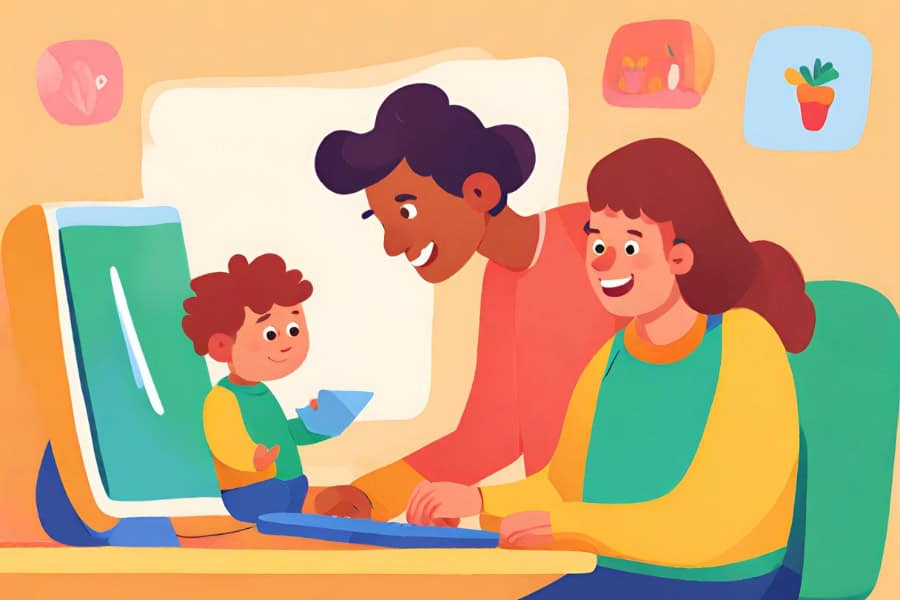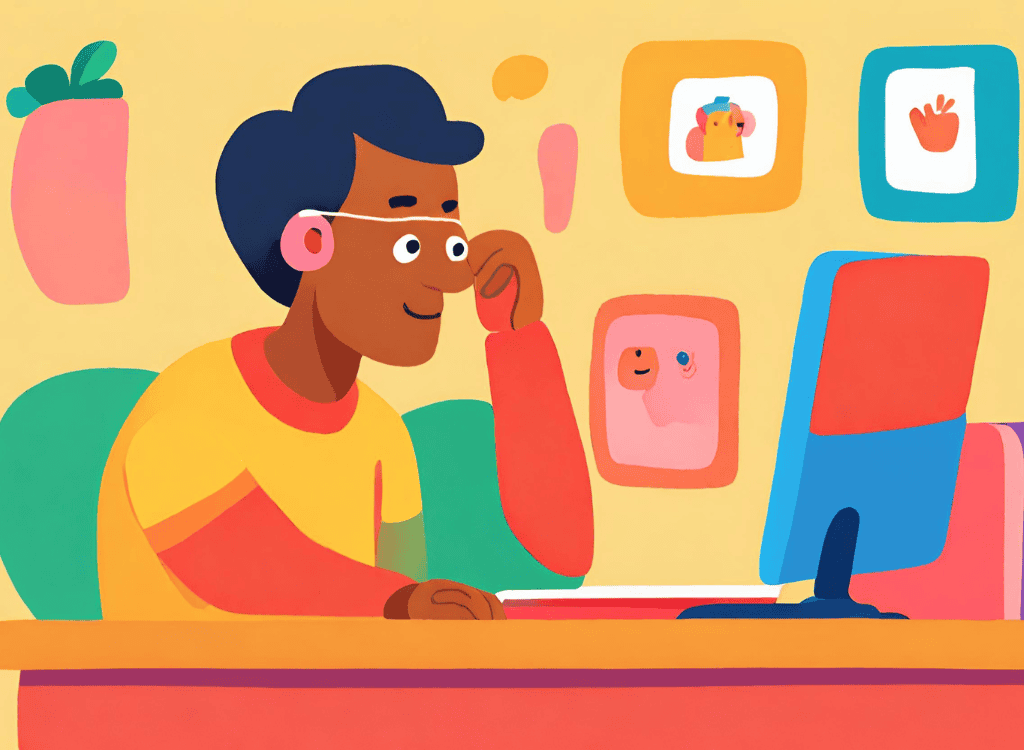What Is The Meaning Of Digital Parenting?

Parenting is more than just about teaching your child to say “please” and “thank you.” It’s also about ensuring they are safe and responsible at all times, and especially while they’re online. Welcome to the ever changing era we like to call, “Digital Parenting.” What does digital parenting even mean? How do you become an effective digital parent, and what are the challenges you can face along this journey? In this blog post, we will explore all of these questions and discuss how tools like your digital wellbeing and necessary parental controls can make your digital parenting journey a bit easier.
What is Digital Parenting?
Digital parenting involves how you oversee your child’s daily online activity and how to ensure their digital wellbeing while they browse and play. More than ever before, the internet is becoming a playground for children of all ages and parents need to stay ahead of the curve to ensure safety. It is not only about monitoring their daily screen time but it is also about helping to guide them on how to make responsible choices online.
Digital parenting goes beyond just setting rules and regulations for your child. It is about creating an open and safe dialogue where children feel comfortable discussing their online experiences with their parents. Our goal as parents should be to foster a balanced relationship with technology while ensuring the child’s safety and also their mental health.

How Do You Become a Digital Parent?
Learning how to be a digital parent in today’s world where everything from school to play is online requires more involvement than just downloading a few apps. Here are a few important and actionable steps you can use to help you get started:
- Educate Yourself: Learn about the apps, websites, and platforms that your child uses and which ones they use the most often. This also includes understanding the necessary in -app privacy settings that need to be updated semi-often, knowing the potential risks involved in your child’s online activities, and staying updated on the latest trends in technology.
- Set Boundaries: Use the app’s built in parental controls to set age-appropriate restrictions and daily limits on screen time for all of the programs and apps they use. Setting screen time limits daily takes there mind off of the device and puts them back into the real world. Encourage them to play board games or do a physical activity equal to the amount of their daily screen time.
- Encourage Open Communication: Create and foster a safe space for your child to come to you to share their online experiences, good or bad that they encounter or maybe that their friends encounter. Ask them open-ended questions (versus yes or no), listen to any of their concerns that are brought up, and discuss the potential risks and benefits of their digital activities.
- Lead by Example: Children often imitate what they see their parents doing, especially when it comes to technology. Showing them responsible digital behavior by practicing good digital habits like taking necessary breaks, setting screen time limits, avoiding oversharing of information, and using our devices mindfully is a great way to model what to do.

What is the Role of Parents in the Digital Age?
Parents play a pivotal role in guiding their children through the ever evolving maze of today’s digital world. The primary responsibility for parents lies in teaching your child about digital literacy, which includes understanding the importance of their online privacy, recognizing how to spot misinformation when they encounter it, and developing the necessary critical thinking skills that they will need throughout their life.
Parents also need to ensure their children’s digital wellbeing by employing actionable tools that are available like digital parental controls. These controls help to monitor your child’s daily online activity, block any potentially harmful content, and set age-appropriate time limits, making it easier to manage your child’s screen time daily.
What Are the Challenges of Digital Parenting today?
Digital parenting comes with its own set of new challenges in today’s society. Here are a few that we have found that many parents encounter:
- Information Overload: There’s so much for parents to know and to learn about the digital world that it can feel overwhelming, even if their semi in the know. The Internet and technology are changing by the second and it’s hard to keep up with all the new equipment or even trends.
- Privacy Concerns: Balancing your child’s right to privacy with the need to monitor their online activities for safety can be tricky, especially as they get older.
- Technology Evolving Rapidly: Keeping up with all of the new platforms, apps, and online trends is a constant battle for everyone. Today is one thing and tomorrow it will be another thing, it’s hard to keep up when things are constantly changing.
- Screen Time Management: Setting reasonable and age-appropriate screen time limits without causing conflicts or emotional distress is a delicate task to balance. Digital literacy is important but balancing it with other activities can be difficult, but not impossible. Young children need less screen time than older children who are in school who may need to do homework or to decompress after a long day.

Why Can Parenting in the Digital World Be Challenging?
Parenting in today’s digital age is challenging because the rules are constantly changing and evolving. The digital world doesn’t come with a manual, and each child is unique and different from the next. Some kids may thrive with very minimal screen time, while others may require a more structured approach to online activities. We are seeing it more and more, as technology evolves, so do the risks. New apps, games, and platforms emerge on the market all the time, creating all new challenges and threats for parents to navigate and wade through.
Parents, more than ever, need to adapt to these changes, learn continuously, and stay connected and involved with their children’s online lives.
What Are the Different Digital Parenting Styles?
Digital parenting styles can often reflect how a parent approaches traditional parenting. Some of the common parenting styles can include:
- Authoritarian Digital Parenting: Strict rules and constant over your should type of monitoring with little room to no for negotiation. Often this style is called “my way or the highway” type of parenting.
- Permissive Digital Parenting: Minimal rules, guidance and oversight, allowing the child more unchecked freedom to browse what they choose.
- Authoritative Digital Parenting: A more balanced approach with a set of very clear rules and boundaries, but also fosters an open communication between parents and their child. This style tends to foster a mutual respect between the child and parent.
- Uninvolved Digital Parenting: A more minimal level of engagement or guidance from the parents in their child’s digital activities.
Each of these style has its pros and cons to evaluate, and the best approach often depends on your child’s age, their maturity level, your family values, and your child’s past behavior. The more involvement a parent has, the less likely the child will run into problems or safety issues due to parental guidance.

What is Cyber Parenting?
Cyber parenting is a newer term created to merge digital parenting with cyber safety. It focuses more on how parents can teach their children about how to protect themselves with regards to their cyber safety. This involves educating them about any potential online dangers or the common scams they might encounter, such as the rise of cyberbullying, age inappropriate content, and the ways predators can target them online. It is about empowering your child with the knowledge and skills they need to navigate the internet safely and responsibly.
Nutcracker Offers Digital Comfort for Digital Parents!
Navigating the ever changing and complex world of digital parenting doesn’t have to be daunting as it may seem because Nutcracker is here to help! Our comprehensive digital parenting platform offers new and innovative tools designed for your child’s digital wellbeing and the parental controls to monitor online activity. Nutcracker allows you to monitor your child’s online activity, set clear, firm, and healthy boundaries, and help your child engage in meaningful conversations about their digital world.
With Nutcracker, you can ensure your child’s online safety while fostering a healthy relationship with the technology they use. Nutcracker is designed to make your digital parenting journey smoother, more informed, and stress-free as it can be!
Are you ready to start and to take control of your child’s digital life and online safety?
